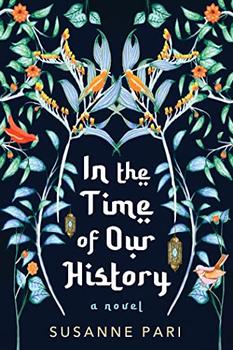Summary | Excerpt | Reading Guide | Reviews | Beyond the Book | Readalikes | Genres & Themes | Author Bio

Abruptly, she stood and walked toward the dining room. It was pointless to torment herself with such thoughts. She opened the bottom drawer of the mahogany credenza and removed a pile of tablecloths. Setting the pile on the table for twelve, she went back down to the laundry room and lugged the ironing board up to the family room, pulled it squeakily up to waist height, and went to retrieve the iron. Yes, the tablecloths had been ironed after the last washing—a year ago, the funeral—but the fold lines needed to be pressed out. How had she forgotten to place this important task on her list? But she knew how; Olga had always been in charge of the ironing. Shireen looked at her watch again, with clear intent now, determined that if she worked swiftly on the tablecloths, she would have time to do her toilette and finish dressing before Mitra arrived.
Olga
In the time of our history when the Soviets retreated from an untamed Afghanistan and the terrorists in the news were Irish and Italian, there was an Unconventional Woman who returned unwillingly to the country of her birth. She settled in the capital and pined for her adopted family in America, praying for its patriarch's absolution that would take her back there, even to the monotonous suburbs she loathed. Soon, however, her watery eyes could not ignore the misery wrought by the dictator Ayatollah and the dictator Saddam during eight years of war. For the nation, nothing was gained and nothing lost—the borders remained intact. The cost, however, was borne by the wailing women robbed of their sons, husbands, fathers, brothers—hundreds of thousands returning, not in glory, but in burial shrouds. Those who survived trickled home, maimed, traumatized, wheezing from the gas.
The Unconventional Woman did what was in her nature. She cooked.
Aromas wafted from her apartment, flooding the hallways and elevators with the scent of basmati rice softening in boiling water and belching its floral scent, of saffron and dill, of mutton and mint. The neighbors were lured, and she welcomed them with piroshki and eggplant omelets and noodle soup; halva and chickpea cookies and saffron ice cream. Food was a balm, and to it she added her flair for telling stories from the old days when the people could dance in cabarets and buy Coca-Cola and watch a French film in a movie house. Stories also of America, of the children there she still pined and prayed for. There was hope, she told them; the war was over. She felt useful and appreciated.
But then the Summer turned Bloody. The dictator Ayatollah sent his guards to Purge the disloyal, the US Navy launched a Mistake missile that plunged three hundred innocents into the Gulf, and the militia marked and followed the artists and intellectuals. Now the scent of Suspicion took the place of everything else in the air. The Unconventional Woman wanted to fold inward, to surrender to old age and aloneness. But it was not to be. The chefs and the storytellers become known to the Underground through whispers. Writers, artists, filmmakers, journalists, teachers—their soft, desperate knocks came at her door. She fed them, and more.
Excerpted from In the Time of Our History by Susanne Pari. Copyright © 2023 by Susanne Pari. Excerpted by permission of Kensington Publishing. All rights reserved. No part of this excerpt may be reproduced or reprinted without permission in writing from the publisher.
Use what talents you possess: The woods would be very silent if no birds sang there except those that sang best
Click Here to find out who said this, as well as discovering other famous literary quotes!
Your guide toexceptional books
BookBrowse seeks out and recommends the best in contemporary fiction and nonfiction—books that not only engage and entertain but also deepen our understanding of ourselves and the world around us.